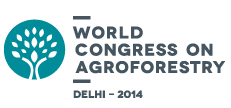Tree borne oil seed crops – a step towards building energy security in rural India
Tree borne oil seed crops – a step towards building energy security in rural India
wca2014-1633 Balakrishna Gowda 1,*Prasanna KT 1Navin Sharma 2 1Forestry and Environmental Science, University of Agricultural Sciences, Bangalore, Bangalore, 2Biofuels, ICRAF, New Delhi, IndiaNon edible tree borne oil seed crops are known to be multipurpose trees in agriculture system. Adoption of multispecies consortia of non edible oil seed trees in agroforestry systems supports productivity in food crops. The recent trend of using vegetable oil for biofuel production and use them locally is of great relevance. The fact is that, these resources are recycled locally without detrimental to the carbon sinks. Among the consortia of species Pongamia pinnata, Azadirachta indica and Simarouba glauca, Calophyllum inophyllum, Mesua ferrea, Aphanamyxis polystachya, Jatropha curcas have found to be a good combination of trees in agro forestry systems with wider adaptation to dry land to semi wet crop fields. The consortia support the sustainable yield of food crops, improve soil fertility and help in pest management in the crops. Besides, these species also provide for production of energy from seed oil on par with petro diesel. Involvement of community in harnessing this energy locally through biofuel value chain is the model developed. Participation of community in growing selected trees in agro forestry system as a component and processing of seeds for oil extraction and using it locally for agriculture machineries as energy source, for production of electrical energy for local needs, use of by products like oil cake as a source of manure, biogas production and animal feed is interesting. A successful model developed and implemented in the state of Karnataka, India with participation of farming community organised on the lines of the milk union existing in the state is presented.

